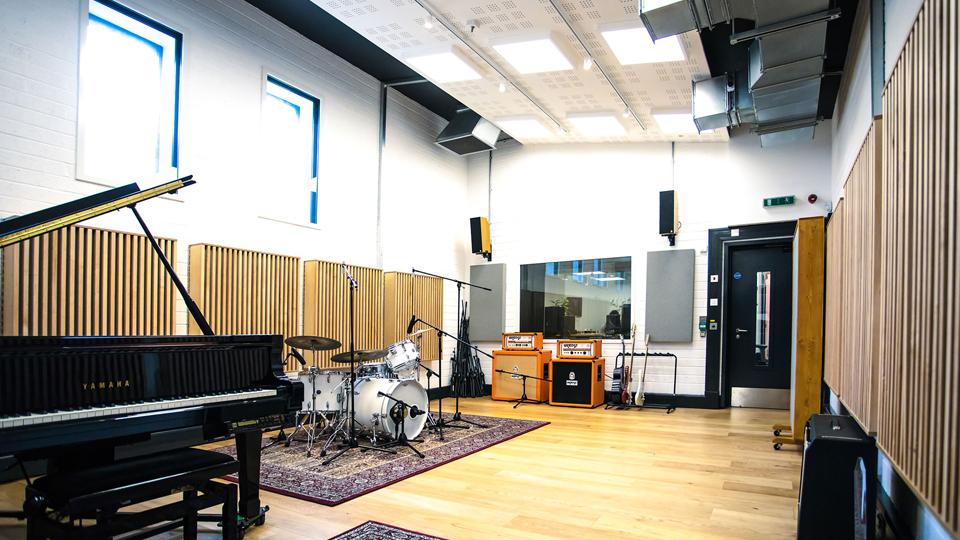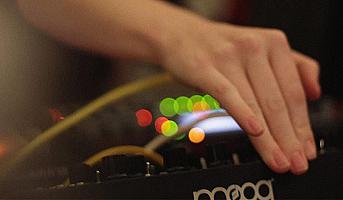MA
Music (Audiovisual Cultures)
Content navigation menu
Why study MA Music (Audiovisual Cultures) at Goldsmiths
The MA Music (Audiovisual Cultures) offers you a unique opportunity to engage with cutting-edge interdisciplinary research on music and the moving image.
You will investigate the audiovisual culture of film, video games, social media, augmented reality, protest chants, music videos, opera, television, and the sounding visual arts from a range of perspectives and approaches, including theoretical and aesthetic debate, ethnographic filmmaking, and multimedia collage.
Study across disciplines: As a student of audiovisual culture, you will gain an interdisciplinary understanding of how music and the moving image work together in a variety of contexts. Modules from the Department of Music cross the spectrum of audiovisual cultures, from pop and contemporary art music, to ethnomusicology and the sonic arts. You can also choose from a range of related topics in other departments on subjects including world cinema, postcolonial theory, gender and sexuality, and communication theory.
Explore new approaches to critical thinking: This MA degree combines essay-based assignments with refreshed forms of scholarship, including the curation of online content, filmmaking, vlogging, installation work, sound walks, digital archiving, and collaborative creativity. Throughout your time at Goldsmiths, you will be encouraged to cultivate a creative approach to your critical thinking and to challenge the norms of academic scholarship.
Pioneering teaching: As a student on this programme, you will join a department renowned for its progressive and creative work with audiovisual theory, composition, and performance-as-research. You will be exposed to Goldsmiths’ unique approach to learning and teaching, which combines theory with creative practice and welcomes cross-cultural perspectives.
Vibrant audiovisual community: The department is celebrated for its multi-disciplinary work with music and media, with staff producing internationally significant work in audiovisual theory, orchestration for film, audiovisual composition, music computing, creative practice, and ethnographic filmmaking. You will be encouraged to attend a lively events programme, which includes our international research seminar series and various related research units, such as the Unit for Sound Practice Research, the Contemporary Music Research Unit, the Popular Music Research Unit, Music and Ethnographic Film, and the Fringe and Underground Music Group.
Contact the department
If you have specific questions about the degree, contact Holly Rogers.
Length
1 year full-time; 2 years part-time
Entry requirements
You should have (or expect to have) an undergraduate degree of at least 2:1 standard in Music or related subject. Your qualification should comprise a substantial relevant practical/creative element. You might also be considered if you can show you have the ability to work at postgraduate level.
Fees
Home - full-time: £9630
Home - part-time: £4815
International - full-time: £19520
Department
What you'll study
Full-time students take the following modules:
| Module title | Credits |
|---|---|
| Music and Audiovisual Culture | 30 credits |
| Practice Research in Music | 30 credits |
| Audiovisual Cultures Major Project | 60 credits |
You will also take optional modules worth 60 credits, two of which must be offered by the Department of Music.
Part-time students
Part-time students take Music and Audiovisual Culture (30 credits) and complete the Audiovisual Culture Major Project (60 credits) and choose optional modules worth 90 credits, one of which is Practice Research in Music.
Note about optional modules (if available): The above is indicative of the typical modules offered, but is not intended to be construed or relied on as a definitive list of what might be available in any given year. The module content and availability is subject to change.
Teaching style
The programme is taught through a mixture of lectures and seminar sessions, tutorials, and where relevant, workshops. Taught sessions and lectures provide overviews of themes, which you are encouraged to complement with intensive reading for presentation and discussion with peers at seminars. You’ll also be expected to undertake a significant amount of independent study.
Bespoke projects
As a student of audiovisual media, you can also become involved in several projects:
- Postgraduate students in the Department of Music edit their own peer-reviewed scholarly journal, Sonic Scope: New Approaches to Audiovisual Culture. You will gain valuable work experience by joining the scholarly editorial team to source, edit and promote content for the new issues, make promo videos, work with the social media and publicity team and submit work for possible publication.
- Longplayer is a bi-annual festival of experimental music which threads from campus, through the streets of Deptford, and all the way to the River Thames. You will be welcome to join the planning team for the event.
- PureGold is the Department’s annual live music festival, run in collaboration with the Department’s record label, NX Records. You will be encouraged to join the vibrant team of performers, presenters, and technicians during your time at Goldsmiths.
- Music Week is a festival that opens every academic year. All music students participate by joining one of our numerous ensembles to perform around campus.
There are also many ways to become involved with audiovisual culture outside of the Music department. Invention, Creativity and Experience is a college-wide research strand that deals with virtual and augmented realities, and the Embodied AudioVisual Interaction research Group is a cross-department research group working on sound as a medium.
What our students say



Facilities
Students on the MA Music (Audiovisual Cultures) will have access to:
You will also have access to a range of mac labs, rehearsal studios, commercial cinema spaces, and performance spaces.

Goldsmiths Music Studio

Electronic Music Studio
Entry requirements
You should have (or expect to be awarded) an undergraduate degree of at least upper second class standard in Music or an equivalent subject.
Students who have completed up to 90 credits (not including final 60-credit projects or dissertations) of a comparable degree at another university can apply for recognition of prior learning status as part of their application for a place on the programme, where such credits are carried forward into your study at Goldsmiths.
International qualifications
We accept a wide range of international qualifications. Find out more about the qualifications we accept from around the world.
If English isn’t your first language, you will need an IELTS score (or equivalent English language qualification) of 6.5 with a 6.5 in writing and no element lower than 6.0 to study this programme. If you need assistance with your English language, we offer a range of courses that can help prepare you for postgraduate-level study.
How to apply
Apply directly to Goldsmiths using our online application system
To complete your application, you will need to have:
- Details of your academic qualifications
- The email address of your referee who we can request a reference from, or alternatively a copy of your academic reference
- Copies of your educational transcripts or certificates
- A personal statement
When to apply
We accept applications from October for students wanting to start the following September.
We encourage you to complete your application as early as possible, even if you haven't finished your current programme of study. It's very common to be offered a place that is conditional on you achieving a particular qualification.
Late applications will only be considered if there are spaces available.
If you're applying for funding, you may be subject to an earlier application deadline.
Selection process
You will normally be required to attend an interview, and you may be asked to submit examples of your written work in advance (such as an essay of at least 1,500 words on a relevant topic).
Find out more about applying.
Fees and funding
Annual tuition fees
These are the PG fees for students starting their programme in the 2024/2025 academic year.
- Home - full-time: £9630
- Home - part-time: £4815
- International - full-time: £19520
If your fees are not listed here, please check our postgraduate fees guidance or contact the Fees Office, who can also advise you about how to pay your fees.
It’s not currently possible for international students to study part-time under a student visa. If you think you might be eligible to study part-time while being on another visa type, please contact our Admissions Team for more information.
If you are looking to pay your fees please see our guide to making a payment.
Funding opportunities
BAME Music Scholar's Fee Waiver
This full-tuition fee-waiver scholarship aims to support a BAME student who intends to progress through postgraduate study and into an academic research position.
Sarah Caple Award
Funding to enable students to further their studies or musical development.
Find out more about postgraduate fees and explore funding opportunities. If you're applying for funding, you may be subject to an application deadline.
Additional costs
In addition to your tuition fees, you'll be responsible for any additional costs associated with your course, such as buying stationery and paying for photocopying. You can find out more about what you need to budget for on our study costs page.
There may also be specific additional costs associated with your programme. This can include things like paying for field trips or specialist materials for your assignments. Please check the programme specification for more information.
Careers
Where your degree can take you
The diverse content of this Masters, and its range of assessment styles, will provide you with transferable skills useful for a range of employment options once you graduate.
Subsequent careers could include:
- Academia
- Publishing
- Broadcasting
- Work in film and television sound departments
- Journalism, the creative and cultural industries
- Music management
- Arts administration
- Research in and composition for new media and online culture
- Sound curation
- Librarianship
- Teaching
- Digital archiving
- AR and VR consultancy
Alumni
Alumni who have earned an MA in Music from Goldsmiths include internationally renowned scholars, including Chris Banks (formerly Head of Music Collections at the British Library), Dame Janet Ritterman (former Director of the Royal College of Music), Edward Gregson (Principal of Royal Northern College of Music), John Heighway (Vice Principal of Trinity College of Music), Roger Parker (Professor at King's College, London) and Philip Meaden (Principal of the Leeds College of Music).





